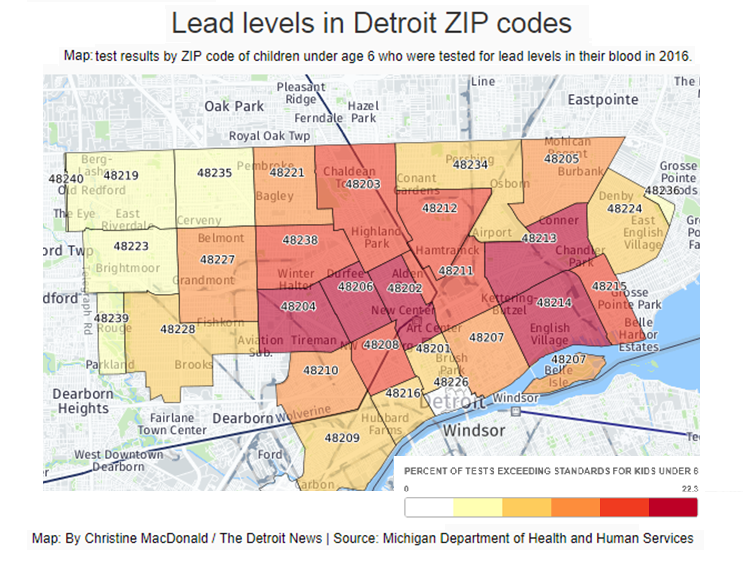City of Detroit Rental Property Lead Clearance Requirements
2017-2022
This page includes the historical Rental Property Ordinance requirements based on the October 31, 2017 amendments. These requirements were in effect until the new Ordinance revisions passed in October 2021 and made effective as of January 3, 2022.
For the current requirements, go to the current Lead Clearance Requirements for Detroit Rental Property page.
October 31, 2017 Lead Clearance Amendments
Tri-Tech has reviewed the update to the Ordinance and has noted the following changes as it pertains to the Lead Clearance and additional Re-Evaluations for lead:
- An online code compliance registry will be maintained on the City website, including an interactive map of rental properties.
- Civil fines for noncompliance are proposed to be increased 2.5 to 10 times current amounts, depending on the offense.
- Enforcement will be scheduled based on zip code according to a schedule promulgated by the department and posted on the city’s website. The schedule shall be promulgated no later than 60 days following the effective date of the ordinance. There is some indication zip codes will be combined into five compliance zones. Landlords will be given a six-month compliance window.
- A grace period is specified to allow rental property to be occupied without a lead clearance report. “The owner shall not be required to obtain a lead clearance until the next prescribed annual inspection date for the owner for the rental property occurring after the effective date of the ordinance that added this section.”
- An additional measure was ratified that it shall be unlawful for an owner to collect rent for occupancy of a rental property, during or for any time in which there is not a valid certificate of compliance for that rental property. This appears to be subject to the compliance grace period noted above. The tenants may pay the rent due into a third party escrow account. The Owner has 90 days to achieve compliance for release of the escrow funds before the funds revert to the tenant. There is an additional 60 day window of compliance for the following two months escrowed rent.
- A provision allows for a temporarty Certificate of Compliance whenever there are practical difficulties provided it doesn't lessen the health and safety of a building. A possible example of this would be granting an Owner and extension through the winter months to repair exterior LBP. There is also an appeals hearing process for the City failure to grant a Certificate of Compliance that could be used by an Owner to assert that extenuating circumstances have delayed compliance.
- The provision about occupancy without a certificate of compliance being unlawful was removed. Rental property can only be ordered vacated for landlord non-compliance due to “immediate danger.”
- All properties must have a Lead Based Paint Inspection. A Risk Assessment can be deferred if no damaged LBP is found. In this circumstance, the Risk Assessment requirement is only triggered by a change in tenant, not to exceed more than one per year. There is an opportunity here for a savvy pro-active owner with stable tenants! See the highlighted discussion below.
- Full abatement and/or renovation removal after the LBP Inspection would negate the requirement for a Risk Assessment.
- After Lead Clearance is obtained, an annual Risk Assessment is required if lead hazards were previously identified and corrected by Interim Controls ( this is unchanged but was generally not enforced less than three years).
- If all lead hazards are addressed by enclosure, Risk Assessment to verify the integrity of the enclosures is only required every five years.
Six percent of all Detroit children tested in 2004 had lead poisoning, three times the national average. The City of Detroit firmly believes education can be improved and crime can be reduced by reducing child lead exposures.
Lead is heavy. Lead dust and paint chips can easily be controlled by using drop cloths and plastic barriers. Lead dust is easily cleaned from most surfaces by common cleaning techniques. Thus, most child lead exposures from lead work are preventable.
Zip Code Based Enforcement
Learn more about the lead testing protocols consisting of Inspection, Risk Assessment and Clearance.
Based on Detroit News and City of Detroit estimates, only 5-10% of rental property was in compliance as of 2017.
The Surprising Concession to Owners
The revisions have become more strict. The Annual Risk Assessment requirement can be seen as onerous and expensive (and possibly not enforced more than every 2-3 years). However, a provision not highlighted in news coverage or the City website is one concession given to building owners:
If a Lead Inspection finds no damaged LBP, the Risk Assessment can be deferred until unit turnover! There is an incentive to repair all paint prior to completion of the Lead Inspection. A resident who stays in the house for eight years would result in a cost savings of at least $750.
Zip code 48214 leads the state in lead poisoning, with 17% of children affected. Zip codes 48209, 48210, 48204, 48238 had the highest occurrence until recently.
You can download the Ordinance here:
A zip code based enforcement plan was developed to generally prioritize the areas with the highest rates of child lead poisoning. As part of this enforcement plan, it was proposed that evictions would not be permitted without Certificates of Compliance if deadlines were not met according to the zip code enforcement schedule. This plan was approved by Chief Justice William McConico on August 13, 2020.





